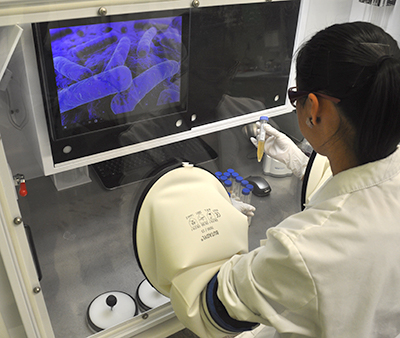Taking a Year Off

After spending years in college – first as an undergraduate and later as a veterinary medicine student, Belen Hernandez actually postponed her scheduled graduation for a year.
And if she had to do it all over again, Hernandez would do the same thing.
Hernandez spent that year at the National Institute for Health as part of the Medical Research Scholars Program (MRSP). The yearlong research training program is designed to attract creative, research-oriented veterinary, medical and dental students to the NIH campus in Maryland where they engage in a basic, clinical or translational research project with an experienced research mentor.
Hernandez, who was attending veterinary school at Colorado State University at the time, worked with a veterinary pathologist. There she studied the genetics of dogs to understand a particular type of melanoma in humans in areas that are not exposed to the sun such as inside of a nose or the gums.
“This type of melanoma is much more common in dogs than it is in humans,” Hernandez said, “even though dogs get this cancer in the same places.”
It was the study’s bridge between the veterinary and non-veterinary scientific research community that Hernandez enjoyed about the MRSP program.
“MRSP was an extraordinary opportunity,” she said. “I now have a great sense of accomplishment in having been able to contribute to this trans-disciplinary partnership, knowing it further established a path for future veterinarians.”
After spending a year at the NIH and graduating with her DVM from Colorado State, Hernandez began looking for another school where she could work on a PhD in veterinary pathology. She choose Iowa State because of its excellent veterinary pathology program.
She is continuing in the first year of a five-year PhD program that has allowed her to stay involved in research. It’s a much different trek than she thought she would be taking at this point in her career.
“When I started in vet school, I wanted to do a little bit of everything,” she said. “But once I started working in a research lab, I really got into it and wanted to work in this area for my career.
“In clinical practices we can help our patients only so much,” Hernandez continued. “There are limitations based on our skills and the technology available to us. By researching a problem, we can help find why this is happening and can give clinicians on the front line more information on how to deal with a disease. There’s a lot we can give our patients and clients through research.”
October 2018
